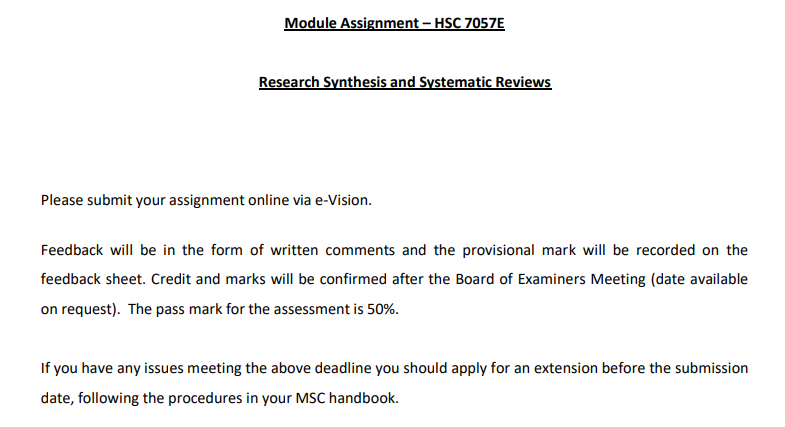HSC-7057E Research Synthesis and Systematic Reviews Assignment Details 2025 | UEA

HSC-7057E Assignment: Research Protocol
This assignment asks you to write a research protocol for a research synthesis project. The protocol should be no more than 4000 words in length, on a subject of your choice. The protocol can be either quantitative or qualitative in nature. The protocol is envisaged to relate to your area of interest, and therefore on a health or social care-related topic. The protocol should be clearly thought-out and presented. You may find the suggested structure below useful as these areas should be considered within your research protocol. If you are also completing the dissertation module, please ensure you understand that:
To avoid plagiarism and double counting. If you decide to undertake the same topic that you have used for the assignments in either Further Quantitative Methods, Further Qualitative Methods or Systematic Review modules then you will need to append the marked assignment to your completed dissertation. You will also have to write a document of not more than 500 words detailing the feedback that was given for the assignment and the changes you have made in light of that feedback. The rest of the dissertation will then follow the usual format with full justification for methodological choices but with the marker aware of what feedback has already been received. Students opting to do a different topic will not need to carry out this extra writing.
Suggested Protocol Structure
1.Title
This should be clear and succinct.
2.Aims of the investigation
In two or three sentences, clearly outline what you plan to investigate. This focuses the reader to better understand the following sections.
3.Background and rationale
This section will provide the reader which in-sight into the topic you plan to investigate. You should therefore present the population involved, the aetiology and epidemiology of the condition, the typical management of this populations (assessment and treatment), and what uncertainties remains within the evidence-base. This should lead to a clear rationale for why it is currently worth undertaking this research synthesis project. Through this, it will be clear how your study would fit within to related work, and the current evidence-base.
4.Research question/hypotheses
These should be clearly stated. The protocol may not suit a hypothesis form, and therefore a research question may be more suitable. Whatever form is taken, this should be tightly constructed, with a specific and focused statement.
5.Design
The design of the research project should complement the research question. It is therefore important to consider whether this research design approach will be able to answer the question.
6.Search Strategy
What search databases will you review? Will additional search strategies be made? Will experts or corresponding authors be contacted? Will reference lists be reviewed? What search terms will you use? Why are these appropriate for your research question? You will need to provide an example of the search strategy including Boolan operators and MeSH terms. For each step, consider why this is important and why these decisions are made, so that you can justify each methodological approach adopted.
7.Eligibility Criteria
What will your inclusion and exclusion criteria be? Why were these chosen? What is the implication for excluding certain populations/study designs/outcome measures? Justification for each of the decisions should be made.
8.Outcome measures
What are your primary and secondary outcome measurements? Why have these been chosen? What is your primary end-point? These decisions should relate to your research question.
9.Study Identification and Data Extraction
How are your eligible papers to be identified? By who and when? Once identified, who will extract the data? How will this be performed and recorded? You may choose to include a copy of the data extraction template as an Appendix. Will there be any verification checks for data accuracy? What will happen if errors or disagreements occur? Justification for each of the designs should be made.
10.Critical Analysis
How will you assess the methodological quality of your included papers? What is the reliability/validity of this tool? Who will assess this? When will this be assessed? How will this be recorded? You may choose to include a copy of the critical appraisal template. Will there be any verification checks for data accuracy? What will happen if errors or disagreements occur? Justification for each of the decisions should be made.
11.Plan of analysis
You should demonstrate that you have a clear idea of how you will use the data to answer your research question(s). Who will perform the data analyses? Will the results be narratively reviewed or will meta-analysis techniques be adopted? If so, what tests will you use? How will you identify the themes generated? How will you present this data? How will methodological and statistical heterogeneity be evaluated? How will publication bias be assessed? How will the results of the methodological appraisal impact on your data analysis i.e. will a sensitivity analysis be performed? Will any secondary analyses be performed? Justification for how and why each of these decisions has been made should be presented. This should help you to check that the design really is appropriate to answer your research question.
12.Plan for Dissemination
How will the results of your research synthesis project be disseminated to maximise its impact? Who should the findings of your project be presented to? Why will these approaches be taken?
13.Timetable and Resources
You should give an idea of when the various phases of the study will be conducted. When do you expect to be searching for the literature and extracting the data? You need to plan to allow enough time for analysis, writing-up and dissemination. What resources (people, inter-library loans, open access publication fees, dissemination events) do you need to complete your systematic review?
14.Discussion
You should give a brief evaluation of the strengths and weaknesses of your protocol. You may choose to consider recommendations for further improving the design of the study and the research processes required to answer your research question.
15.References
Include these in one of the standard formats